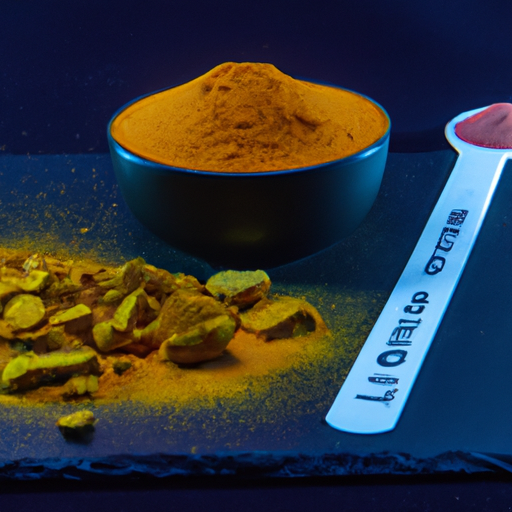Are you searching for a fresh method to add turmeric to your diet? Have you thought about trying turmeric tea with turmeric powder?
Turmeric has been used for centuries in Ayurvedic medicine and is known for its anti-inflammatory and antioxidant properties. In recent years, it has gained popularity in the Western world as a superfood and is often added to smoothies, curries, and even lattes.
But can you use turmeric powder to make tea? The answer is yes, and in this article, we will explore the benefits of turmeric tea, how to make it, and some precautions to keep in mind.
Using turmeric powder to make tea is a simple and easy way to enjoy the health benefits of this powerful spice. Turmeric tea has been shown to help reduce inflammation, boost the immune system, aid digestion, and even improve brain function. And the best part? It’s easy to make at home with just a few simple ingredients.
In this article, we will walk you through the steps to make the perfect cup of turmeric tea, as well as discuss some potential side effects and precautions to keep in mind. So, grab your favorite mug and let’s get started!
Key Takeaways
- Turmeric powder can be used to make tea and has many potential health benefits.
- Adding other ingredients like ginger, honey, and lemon can enhance the flavor and health benefits of turmeric tea.
- Cooking with turmeric can also provide health benefits and can be added to a variety of dishes.
- Choosing high-quality and ethically sourced turmeric powder, such as organic and non-GMO, is important for maximizing potency and purity of the tea.
Overview of Turmeric’s Health Benefits
Did you know that incorporating turmeric into your diet can potentially reduce your risk of chronic diseases such as heart disease and cancer? With its anti-inflammatory properties, turmeric supplements have been found to help with a number of health issues, including digestive problems, arthritis, and skin conditions.
It’s also been suggested that cooking with turmeric can help reduce inflammation in the body and lower the risk of chronic diseases. In addition to its health benefits, turmeric is a delicious spice that can be easily incorporated into your meals.
If you’re looking for a simple way to add turmeric to your diet, you might consider using turmeric powder to make tea. This is a quick and easy way to enjoy the many health benefits of turmeric without having to worry about cooking with it.
Using Turmeric Powder to Make Tea
You can easily add a warm and healthy twist to your daily drink by incorporating a common spice found in most kitchens: turmeric powder. This spice has been used for centuries in traditional medicine and cooking, and recent studies have shown that adding it to your diet can improve brain function and reduce the risk of heart disease. Making turmeric tea with powder is a simple and delicious way to reap the benefits of this powerful spice.
To make turmeric tea, simply mix one teaspoon of turmeric powder into a cup of hot water and stir well. You can also add other ingredients like ginger, honey, and lemon to enhance the flavor and health benefits of your tea. If you prefer, you can also use turmeric tea bags or fresh turmeric root instead of powder. It’s important to note that while turmeric is generally safe for most people, it can interact with certain medications and high doses can cause gastrointestinal issues. It’s recommended to start with a small dosage of turmeric powder and gradually increase as needed.
Turmeric tea is a great alternative to traditional tea and coffee, offering a warm and spicy flavor with numerous health benefits. In the following section, we will delve into the specific health benefits of turmeric tea and how it can improve your overall well-being.
Health Benefits of Turmeric Tea
Get ready to feel rejuvenated and refreshed as you sip on a warm cup of turmeric tea. It’s been known to provide a multitude of health benefits and has been used for centuries in traditional Ayurvedic medicine to treat a range of ailments.
The active ingredient in turmeric, curcumin, is a powerful antioxidant and anti-inflammatory agent that can help reduce inflammation in the body. Studies have shown that turmeric tea can also improve brain function, boost immunity, and even reduce the risk of chronic diseases such as cancer and heart disease.
So, if you’re looking for a natural way to improve your health and wellbeing, incorporating turmeric tea into your daily routine might be just the thing for you. In the next section, we’ll explore some tips for making the perfect cup of turmeric tea.
Tips for Making the Perfect Cup
Feeling hesitant about incorporating turmeric into your daily routine? Don’t worry, making the perfect cup of turmeric tea is easier than you think.
Start with a high-quality turmeric powder and add a pinch of black pepper to enhance the absorption of curcumin, the active ingredient in turmeric.
Bring water to a boil and add a teaspoon of turmeric powder for every cup of water.
Let it simmer for 10-15 minutes, then strain the tea and add honey, lemon, or ginger to taste.
Keep in mind that tea brewing is a personal preference, so adjust the amount of turmeric and the steeping time to suit your taste.
Some people prefer a stronger, more pungent flavor, while others like a milder, sweeter taste.
Experiment with different ratios and ingredients until you find the perfect cup that suits your palate.
And if you’re feeling adventurous, try adding other spices like cinnamon, cardamom, or cloves for a unique twist.
Looking for other ways to incorporate turmeric into your diet? Try adding it to smoothies, soups, or curries for a flavorful and healthy boost.
Other Ways to Incorporate Turmeric into Your Diet
Looking to add some spice to your diet? Turmeric can be a flavorful addition to smoothies, soups, and curries. Here are some other tasty ways to incorporate turmeric into your meals:
- Mix turmeric into your scrambled eggs or omelets for a savory breakfast.
- Add a pinch of turmeric to your salad dressing or marinade for a zesty kick.
- Make a turmeric latte by whisking turmeric powder, milk, honey, and cinnamon together.
- Use turmeric to season roasted vegetables like cauliflower, sweet potatoes, and carrots.
In addition to adding flavor to your meals, turmeric also has potential health benefits. Some studies suggest that turmeric may have anti-inflammatory properties and could potentially help with conditions like arthritis and digestive issues. While more research is needed to confirm these benefits, adding turmeric to your diet is a simple and tasty way to experiment with this spice. If you’re interested in trying turmeric supplements, be sure to talk to your healthcare provider first to discuss potential side effects.
Potential Side Effects
Now that you’ve learned about different ways to incorporate turmeric into your diet, let’s discuss the potential risks of using it as a supplement. While turmeric is generally considered safe, there are some potential side effects to be aware of.
These include gastrointestinal issues such as nausea, diarrhea, and indigestion, as well as allergic reactions and interactions with certain medications.
It’s important to note that the dosage recommendations for turmeric supplements vary depending on the specific product and individual needs. It’s always best to consult with a healthcare professional before starting any new supplement regimen, especially if you have a pre-existing medical condition or are taking medications that may interact with turmeric.
By taking precautions and following dosage recommendations, you can safely incorporate turmeric into your diet and potentially experience its health benefits.
Next, we’ll discuss precautions for certain groups when using turmeric as a supplement.
Precautions for Certain Groups
If you’re pregnant or breastfeeding, it’s important to talk to your doctor before taking turmeric supplements. Limited research exists on its effects during these stages. For example, a pregnant woman with a history of miscarriage may need to avoid turmeric supplements due to their potential blood-thinning properties. This could increase the risk of bleeding during pregnancy. Individuals who are taking medication for diabetes, blood thinning, or stomach acid reduction should also exercise caution when consuming turmeric supplements. It may interact with these medications and cause negative side effects.
When it comes to turmeric tea, it’s generally considered safe for most people to consume in moderation. However, if you’re taking medication or fall under a certain group, it’s important to speak with your doctor before incorporating turmeric tea into your routine.
In the next section, we’ll explore the differences between turmeric tea and other herbal teas.
Differences Between Turmeric Tea and Other Herbal Teas
Turmeric tea stands out from other herbal teas due to its unique flavor and potential health benefits. Unlike other herbal teas, turmeric tea has a distinct earthy taste with a subtle hint of spice. This is due to the active ingredient in turmeric, curcumin, which has anti-inflammatory and antioxidant properties that are believed to boost overall health.
To make turmeric tea, there are various recipes and brewing techniques to choose from. Some recipes call for adding fresh grated turmeric root, while others use turmeric powder. When using turmeric powder, it’s important to choose a high-quality brand to ensure the potency and purity of the product. Additionally, brewing techniques can vary from steeping the tea in hot water to simmering it with other ingredients like ginger and honey for added flavor.
When it comes to choosing the right turmeric powder, there are a few key things to consider. In the next section, we’ll discuss the importance of selecting organic, non-GMO, and ethically sourced turmeric powder for making tea.
Choosing the Right Turmeric Powder
When choosing the right turmeric powder, there are a few key points to consider. Firstly, you can choose between organic and non-organic options depending on your preference and budget.
Secondly, it’s important to consider the quality and potency of the powder, as this can greatly affect the benefits it provides. So, take your time to research and choose wisely to ensure you get the most out of your turmeric powder.
Organic and non-organic options
Opting for organic turmeric powder can add an extra layer of health benefits to your tea without sacrificing taste. Organic turmeric is grown without the use of harmful pesticides and fertilizers, making it a safer choice for consumption. Non-organic turmeric, on the other hand, may contain residues of these chemicals, which can pose health concerns when ingested.
In addition to being free of harmful chemicals, organic turmeric is also richer in antioxidants and other nutrients that are beneficial for the body. This means that by choosing organic turmeric powder for your tea, you’re not only avoiding potential health risks but also boosting your overall health.
So, if you want to enjoy a cup of healthy and delicious turmeric tea, opting for organic turmeric powder is definitely the way to go. And when choosing your organic turmeric powder, be sure to look for high-quality options that are potent and pure for optimal results.
Let’s talk about the importance of quality and potency in choosing the right turmeric powder for your tea.
Quality and potency
If you want to experience the full benefits of a healthy and flavorful cup of turmeric tea, you need to pay attention to the quality and potency of the turmeric powder you use. The quality of the turmeric powder can affect the flavor and overall health benefits of the tea. So, it’s important to choose a high-quality turmeric powder that has been ethically sourced and extracted using the right methods.
When it comes to the quality of turmeric powder, it’s important to look for organic and non-GMO options. Additionally, you can check the sourcing practices of the manufacturer to ensure that they use ethical and sustainable practices.
Potency is also important because it determines how much of the active compounds you get in your tea. Extraction methods, such as cold-pressed or CO2 extraction, can affect the potency of the turmeric powder. So, when choosing turmeric powder, look for one that has been extracted using the best methods to ensure maximum potency.
Frequently Asked Questions
What are the different varieties of turmeric powder and which one should I use for making tea?
When choosing turmeric powder for cooking, consider the variety. Alleppey turmeric has a high curcumin content and is great for medicinal purposes, while Madras turmeric has a milder flavor and is better for culinary uses. Turmeric powder benefits go beyond tea, including anti-inflammatory and antioxidant properties.
Can I add milk or sweeteners to my turmeric tea?
Yes, you can add milk and alternative sweeteners like honey or stevia to your turmeric tea. Adding flavors like ginger or cinnamon can also enhance the taste. Experiment to find your preferred combination.
How often should I drink turmeric tea to experience its health benefits?
To reap the optimal Turmeric tea benefits, drink a cup daily. Incorporate Turmeric tea preparation dos and don’ts to maximize its potential. Remember, moderation is key. So, don’t overdo it.
Can turmeric tea help me lose weight?
Turmeric tea can aid in weight loss by reducing inflammation and improving digestion. The benefits of turmeric tea for digestion can lead to better nutrient absorption and a decrease in bloating.
Is it safe to consume turmeric while taking certain medications or supplements?
Before consuming turmeric, it’s important to consider potential drug interactions. For example, turmeric may increase the effects of blood-thinning medications. Always consult with your doctor and follow recommended dosage guidelines to ensure safe consumption.
Conclusion
Congratulations! You now know that using turmeric powder to make tea is a great way to incorporate this superfood into your diet.
Turmeric is known for its anti-inflammatory properties and can help with anything from joint pain to digestion. When making turmeric tea, be sure to add black pepper to increase its bioavailability.
In addition to tea, there are plenty of other ways to incorporate turmeric into your diet. From sprinkling it on roasted veggies to adding it to smoothies, the possibilities are endless.
However, it’s important to note that turmeric can interact with certain medications and may not be appropriate for everyone. As with any supplement, it’s always best to consult with a healthcare professional before adding it to your routine.
As the saying goes, "variety is the spice of life,"and turmeric is one spicy ingredient you won’t want to miss out on. So go ahead, brew yourself a cup of turmeric tea and reap the benefits of this golden spice.










